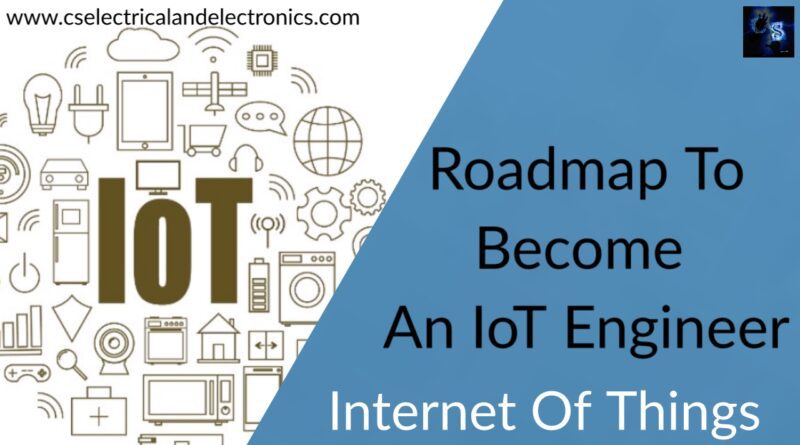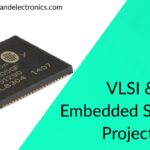Roadmap For How To Become An IoT Engineer, Internet Of Things
Hello guys, welcome back to my blog. In this article, I will discuss the roadmap for how to become an IoT engineer, the Internet of things, skills required to become a IoT engineer, who is an IoT engineer, etc.
If you have any doubts related to electrical, electronics, and computer science, then ask questions. You can also catch me on Instagram – Chetan Shidling.
Also, read:
- Roadmap To Get An Internship At ISRO, Indian Space Research Organization
- Roadmap To Become A Robotics Engineer, Skills, Jobs, Responsibilities
- Roadmap To Become A Embedded Engineer, Jobs, Roles, Responsibilities
Roadmap For How To Become An IoT Engineer
The Internet of Things, or IoT, is a computing concept that depicts the idea of ordinary physical things being connected to the internet and being able to recognize each other.
It’s a virtual network of any form of device with electronics, software, sensors, actuators, and network connectivity that allows them to communicate and connect.
Who is an IoT Engineer?
An IoT Developer/Engineer is a wide term that encompasses a variety of professions and skillsets. Professionals that combine three fundamental components data, technology, and research to design, administer, and monitor IoT devices and systems are known as IoT Developers.
To design the finest IoT solutions for real-world challenges, IoT Developers frequently collaborate closely with Business Analytics, Engineering, Data Science, and Design teams.
How to Become an IoT Engineer?
There is no specific IoT degree. Engineering students and graduates with a basic understanding of electronics and microprocessors are most suited for IoT courses. In engineering schools, the Internet of Things is not covered as a key topic.
The AICTE has updated the undergraduate curriculum, and first-year engineering students will study big data analytics, artificial intelligence, robotics, and the internet of things, as well as participate in an obligatory induction program and internships.
The IoT Course Curriculum includes an introduction of what IoT is, how it works, and how it affects customers and organizations, as well as a full explanation of each layer of IoT and its function.
Communication technology, protocols, and applications are all part of the Internet of Things (IoT). Introduction to the Cloud and Cloud Platforms, as well as other topics.
To succeed as an IoT developer, you must first lay a solid foundation in the following areas:
01. Learn the ins and outs of sensors:
As previously stated, IoT is mostly based on sensors, hence every IoT Developer must have a thorough understanding of sensors. Sensors are the devices that collect and transmit data in an IoT network. You should become familiar with the mechanisms of various types of sensors as well as their architecture.
02. Pay great attention to the user interface:
The two pillars of success for any application, including IoT apps, are the User Interface (UI) and User Experience (UX). Consumers rely on IoT solutions to make their lives easier and more comfortable, therefore you can’t skimp on the user experience. The UI must be lucid, fluid, simply navigable, and optimized for numerous platforms for the UX to be top-notch.
03. Develop your Python and JavaScript skills:
Because most IoT devices and solutions are built on top of advanced programming languages like JavaScript or Python, knowing these two languages is vital for IoT application development. While Python offers quick development and scalability, JavaScript, as a web-based and event-centric language, is suitable for the backend and obtaining device reactions.
04. Get your hands dirty with the Raspberry Pi:
While reputable organizations like IEEE feel that IoT Developers must have a background in Computer Science or Electrical Engineering, technologies such as Raspberry Pi are helping to change this. You may exhibit your abilities and aptitude to potential employers by designing and developing tiny IoT projects with Raspberry Pi.
05. Pay attention to the word “mobile”:
Because of their widespread usage, mobile gadgets such as smartphones and smartwatches have seen an exponential growth curve. You must learn mobile technology abilities because mobile devices are the most favored and popular technology (because of their portability and convenience characteristics). This will assist you in optimizing your IoT apps and solutions for mobile platforms, allowing you to reach a wider audience.
Skills Required to Become an IoT Engineer:
You’ll need the following talents to work as an IoT Developer:
01. You should have hands-on experience coding in Embedded-C, Embedded C++, and Python, among other programming languages.
02. It would be advantageous if you had a thorough understanding of the Linux operating system, including its process management, device management, and connection capabilities.
03. You should be familiar with embedded software architecture and have worked with UML use-case diagrams, class diagrams, and sequence diagrams to effectively portray system architecture.
04. Working with 32-bit ARM cortex M3/M4 controllers requires extensive technical knowledge.
05. Prior expertise with wireless stacks such as Zigbee, Thread, or BLE-Mesh is required.
06. You should be an expert in designing business logic in embedded systems utilizing test-driven methods on RTOS and non-RTOS platforms and be proficient in doing so.
07. I2C, SPI, 1-wire, UART, MODBUS, and DALI are all communication protocols that you should be familiar with.
08. Excellent communication, problem-solving, and critical thinking skills are required.
To sum up, Because IoT is a relatively new industry, there aren’t enough talented and competent workers in the IoT domain, resulting in a significant salary gap between IoT and IT specialists. As a result, in exchange for their abilities and expertise, IoT specialists want substantially greater wages.
I hope this article may help you all a lot. Thank you for reading.
Also, read:
- Roadmap For How To Become An IoT Engineer, Internet Of Things
- Roadmap For Power Engineering, Scope, Companies, Job Profile, Salary
- Roadmap How To Develop A Website From Beginning
- Roadmap To Become A Big Data And Analytics Engineer
- Roadmap To Become A Blockchain Developer, Skills, Scope, Salary
- Roadmap To Become A Content Writer, Jobs, Salary, Skills Required
- Roadmap To Become A Digital Marketer, Responsibilities, Skills, Jobs
- Roadmap To Become A Embedded Engineer, Jobs, Roles, Responsibilities
Author Profile
- Content Writer
Latest entries
 All PostsAugust 25, 2021Top 16 Highest Paying Engineering Jobs in the USA For Freshers
All PostsAugust 25, 2021Top 16 Highest Paying Engineering Jobs in the USA For Freshers All PostsAugust 23, 2021Top 10 Smart Cities In The World, Best Cities To Visit In The World
All PostsAugust 23, 2021Top 10 Smart Cities In The World, Best Cities To Visit In The World All PostsAugust 21, 2021Top 20 VLSI & Embedded Systems Projects for Mtech Students
All PostsAugust 21, 2021Top 20 VLSI & Embedded Systems Projects for Mtech Students All PostsAugust 21, 2021Top 20 Power Systems Projects For MTech Students, Engineering Students
All PostsAugust 21, 2021Top 20 Power Systems Projects For MTech Students, Engineering Students








